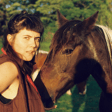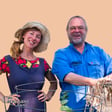
Farming, Self Care & Ceremony with Charlie Showers
Don’t you love it when science geeks get spiritual? I do, because when highly rational folks admit that the world is far more mysterious than it is predictable, it’s intensely validating for us intuitive hippies who’ve believed in magic all along.
This is one of those beautiful and surprising conversations with one of my farming idols Charlie Showers from Black Barn Farm that’ll have you rethinking everything. And/or thinking you want to get into apple growing. DO IT.
Charlie is a geological engineer, agricultural researcher, bushfire and natural disaster expert, fruit tree grafting jedi, permaculture ninja, dad, husband, unapologetically ritualistic bloke and bloody legend.
We traverse:
🍏 Eldership
🍏 The meaning of life
🍏 Men’s circles + gatherings
🍏 Permaculture farming
🍏 Orchard rituals
🍏 First gen farming
🍏 Losing freedom, gaining depth
🍏 Schooling regrets
🍏 Father/son rites of passage
🍏 Self care for men
🍏 Recharging as an introvert
🍏 Advance sleep phase disorder
🍏 Charlie’s #1 most important skill (surprising)
🍏 Anti-fragility
🧙♀️LINKY POOS
Black Barn Farm’s home on the web
Book ~ The Complete Book of Self Sufficiency by John Seymour
Castlemaine Rites of Passage Program
Organisation ~ The Men’s Table
Book ~ AntiFragile: Things That Gain from Disorder by Nassim Nicholas Taleb



















